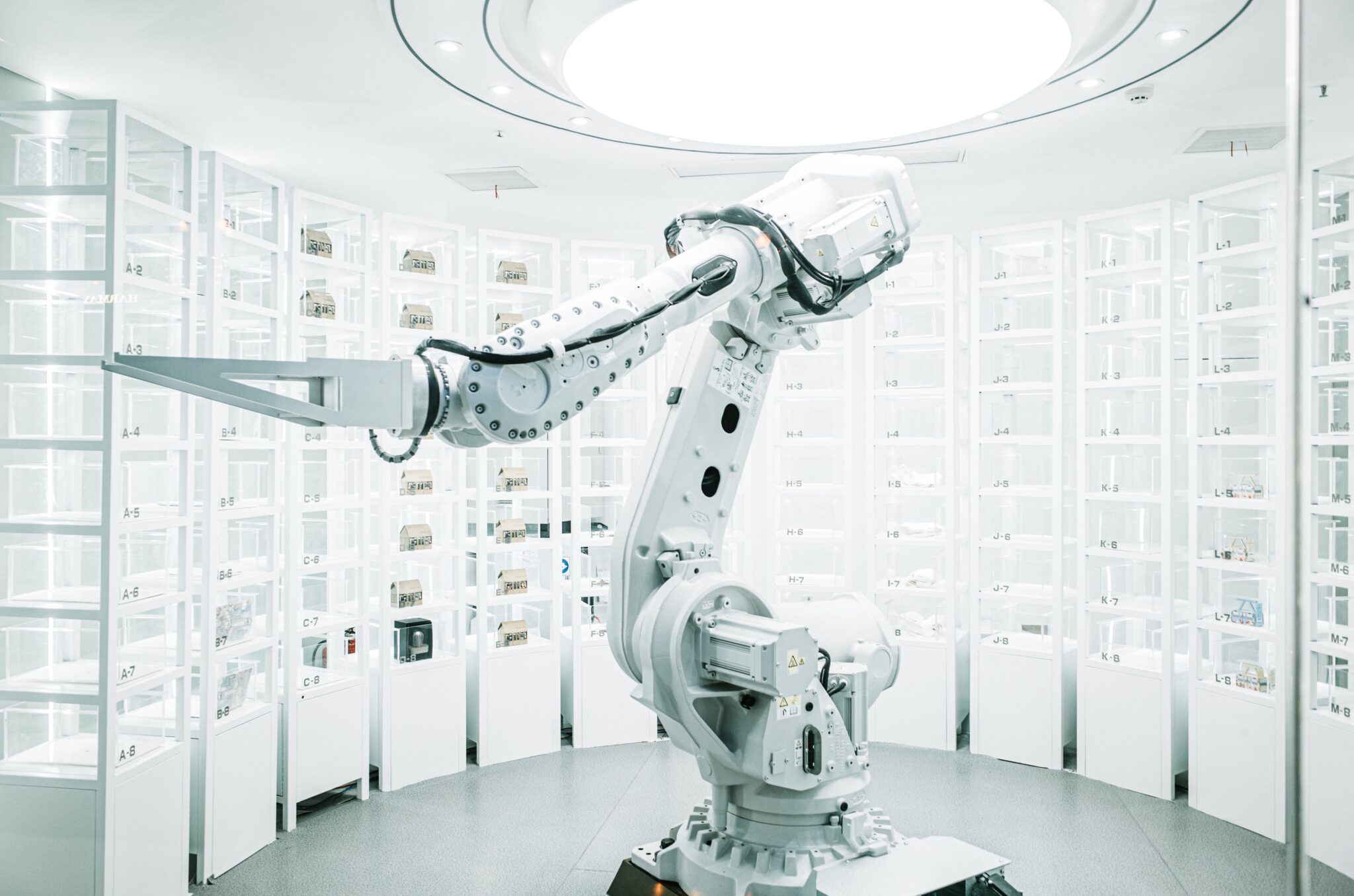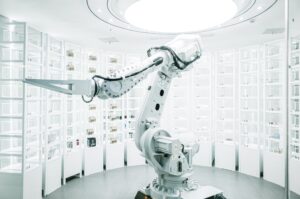
Are you tired of supply chain management headaches? Look no further than artificial intelligence (AI) to streamline your operations and take your business to the next level. With the help of AI, you can optimize your supply chain, reduce costs, and increase efficiency. Imagine having the ability to predict demand, eliminate bottlenecks, and make real-time decisions – all with the power of AI. In this article, we’ll explore the benefits and impact of AI in supply chain management, and how it can revolutionize the way you do business.
Today, more than ever, it’s important to stay ahead of the competition. By embracing AI in your supply chain management, you’ll be unlocking a whole new level of innovation and potential for growth. So, let’s jump into how AI is transforming the supply chain and discover what’s possible with this groundbreaking technology.
AI Revolution: Transforming Supply Chain Operations
Move over humans, there’s a new player in town – artificial intelligence (AI) is revolutionizing supply chain operations at an unprecedented rate. From predictive analytics to real-time decision-making, AI-driven technologies are streamlining processes and improving overall efficiency.
The Many Applications of AI in Supply Chain Management
AI-driven solutions are being used in various ways across the supply chain. Smart warehouses are utilizing AI-powered automation to improve inventory management and reduce human error. AI is also being used to optimize transportation and logistics, improving delivery times and reducing costs. And let’s not forget about demand forecasting – AI’s predictive capabilities allow for more accurate predictions, helping companies make informed decisions.
But that’s not all – AI is also being used for quality control, fraud detection, and even sustainability initiatives. The possibilities are endless!
The Positive Impact of AI in Supply Chain Efficiency
AI is a game-changer for supply chain efficiency. By automating repetitive tasks, companies can reduce the risk of human error and increase productivity. Real-time tracking and monitoring enable companies to make informed decisions on the fly, reducing delays and improving overall performance. And with demand forecasting, companies can optimize their inventory levels, reducing waste and saving money.
But perhaps the most significant impact is on customer satisfaction. With AI-enabled logistics and delivery, companies can provide faster, more accurate service, leading to happier customers and increased loyalty.
AI Solutions for Supply Chain Success
The benefits of AI in the supply chain are clear, but how can companies ensure success when implementing these technologies? One key is to start small and focus on a specific area of the supply chain. This allows for easier integration and minimizes disruption to existing processes. Additionally, companies should ensure they have high-quality data and invest in staff training to ensure everyone is comfortable with the new technology.
- Start small and focus on a specific area of the supply chain
- Ensure high-quality data
- Invest in staff training
By following these guidelines, companies can unlock the full potential of AI in the supply chain and reap the rewards of increased efficiency, productivity, and customer satisfaction.
AI-powered Automation: Enhancing Supply Chain Efficiency
As we’ve mentioned earlier, AI can do wonders in streamlining supply chain operations. From optimizing processes to reducing costs, it’s no wonder AI-powered automation is all the buzz in the industry. But how exactly does AI bring efficiency to the supply chain?
- Real-time visibility: AI can provide real-time visibility into your supply chain operations, allowing you to monitor and track your inventory, shipments, and delivery status with ease. With this capability, you can identify bottlenecks and adjust your operations accordingly to ensure timely delivery.
- Predictive analytics: By analyzing historical and real-time data, AI can provide predictive analytics that help supply chain managers make informed decisions. For instance, it can predict demand trends and suggest inventory levels or adjust production output accordingly.
- Intelligent automation: With machine learning algorithms, AI can automate routine tasks, such as data entry, purchase order processing, and shipment tracking. This allows supply chain managers to focus on higher-level tasks that require human decision-making and strategic thinking.
However, before implementing AI, you need to consider some challenges that come with it. For instance, integrating AI into existing systems can be complex and time-consuming. Additionally, you need to ensure the quality and accuracy of data that AI relies on. Lastly, you need to train your staff to understand how to use AI.
But fret not, overcoming these challenges is possible with proper planning and execution. When done right, AI implementation can bring significant improvements to your supply chain operations.
AI-powered Automation: Making A Case for the Supply Chain Industry
AI-powered automation is a game-changer for the supply chain industry. With benefits ranging from improved efficiency to lower costs, it’s no surprise that more and more companies are adopting AI solutions. For instance, DHL has implemented an AI-powered transportation management system that optimizes delivery routes and modes, reducing transport time and costs. Walmart has also been using AI to predict demand and optimize inventory levels, reducing out-of-stock situations.
The potential of AI in the supply chain industry is huge, and it’s only a matter of time before we see more innovative solutions being deployed.
Unlocking Innovation: AI-driven Solutions in Supply Chain
Artificial intelligence has the potential to unlock unprecedented levels of innovation in supply chain management. With its ability to process vast amounts of data and enable real-time decision-making, AI-driven solutions can revolutionize the way businesses operate.
One of the most significant benefits of AI in the supply chain is its ability to enable predictive analytics. By leveraging machine learning algorithms, businesses can gain insights into historical data and use this information to forecast future demand, optimize inventory levels, and improve overall efficiency. For example, retail giant Walmart uses predictive analytics to ensure that their stores always have the right products in stock at the right time.
Another way in which AI is driving innovation in the supply chain is through demand forecasting. By analyzing market trends and consumer behavior, businesses can use AI-powered algorithms to predict future demand for their products. This helps them make more informed decisions about inventory management, production planning, and distribution.
Real-time decision-making is another area where AI is making a significant impact on supply chain management. By providing businesses with up-to-the-second information about inventory levels, production schedules, and shipping status, AI-powered solutions enable faster and more accurate decision-making. This not only helps businesses respond more quickly to changes in demand but also helps them identify and resolve supply chain issues before they become major problems.
AI in supply chain management in Action
There are many examples of businesses successfully using AI-driven solutions to drive innovation in their supply chain. For example, beverage giants are using predictive analytics to optimize its distribution network, reducing costs and improving efficiency. Similarly, global logistics companies are using AI-powered algorithms to optimize delivery routes, reducing fuel consumption and improving delivery times.
Another example is a fashion retailer, which is using AI-powered demand forecasting to reduce waste and improve sustainability in its supply chain. By accurately predicting demand for its products, the company can reduce overproduction and minimize the environmental impact of its operations.
In conclusion, AI-driven solutions have the potential to unlock unprecedented levels of innovation in supply chain management. By enabling predictive analytics, demand forecasting, and real-time decision-making, AI can help businesses optimize their operations, reduce costs, and improve overall efficiency. As more businesses begin to adopt AI-driven solutions, we can expect to see a wave of innovation sweep across the supply chain industry.
Overcoming Challenges: Implementing AI in Supply Chain
Let’s be real, implementing any new technology can come with its fair share of challenges. But don’t let that scare you off from exploring the benefits of AI in supply chain management. With a little bit of planning and preparation, you can avoid these common pitfalls and achieve success.
Challenge 1: Data Quality for AI in supply chain management
One of the biggest challenges with implementing AI in supply chain management is ensuring that your data is accurate and consistent. Without high-quality data, AI algorithms won’t be able to make accurate predictions or recommendations. To overcome this challenge, it’s important to establish data quality standards and invest in data cleaning and normalization tools.
Challenge 2: Integration of AI in supply chain
Another challenge that businesses face when implementing AI in the supply chain is integrating it with existing systems. Many businesses have complex supply chain systems in place that are difficult to modify or replace. To overcome this challenge, it’s important to work closely with your IT department and vendors to ensure that any AI solutions are compatible with your existing systems.
Challenge 3: Staff Training
Implementing AI in the supply chain requires a certain level of technical expertise, which may not be readily available in-house. It’s important to provide training and support to staff so that they can effectively use and manage AI solutions. This may involve hiring new staff, outsourcing to third-party experts, or providing training programs to existing employees.
Challenge 4: Implementation Cost
Implementing AI in the supply chain can be expensive, especially for smaller businesses. However, the cost of not implementing AI can be even higher in the long run. To overcome this challenge, it’s important to carefully weigh the costs and benefits of implementing AI and to start small with pilot projects before scaling up.
Challenge 5: Security and Privacy
Finally, businesses need to be aware of the security and privacy risks associated with implementing AI in the supply chain. AI algorithms rely on large amounts of data, which can create vulnerabilities for cyberattacks and data breaches. To overcome this challenge, it’s important to invest in robust security measures and to comply with data privacy regulations.
By considering these challenges and taking appropriate action, businesses can successfully implement AI in their supply chain management and reap the rewards of greater efficiency, productivity, and innovation.
Frequently Asked Questions about Artificial Intelligence in Supply Chain
As with any emerging technology, it’s natural to have questions about how artificial intelligence will impact supply chain management. Here are some answers to the most frequently asked questions:
What is artificial intelligence?
Artificial intelligence, or AI, refers to the development of computer systems that can perform tasks that typically require human intelligence, such as visual perception, speech recognition, decision-making, and language translation.
How can AI be used in supply chain management?
AI can be used to optimize supply chain processes, such as demand forecasting, inventory management, and logistics planning. It can also enable real-time decision-making, predictive analytics, and automation, leading to improved efficiency and productivity.
What are the benefits of AI in supply chain management?
The benefits of AI in supply chain management include increased efficiency, reduced costs, improved accuracy, enhanced visibility, and better decision-making. AI can help optimize processes, reduce errors, and improve overall supply chain performance.
What are the challenges of implementing AI in supply chain management?
Challenges of implementing AI in supply chain management include data quality, integration with existing systems, staff training, and cost. It’s important to address these challenges to ensure a successful implementation.
How can I get started with AI in my supply chain?
To get started with AI in your supply chain, identify areas where AI can have the most impact, such as demand forecasting or inventory management. Conduct a thorough evaluation of your data and systems to ensure quality and compatibility. Implement AI gradually, starting with small pilot projects, and provide training and support to staff.
By embracing AI in supply chain management, you can unlock new levels of efficiency, productivity, and innovation. Don’t let the challenges deter you from taking the first steps towards a more optimized supply chain.







1 thought on “Streamlining with AI in Supply Chain Management”